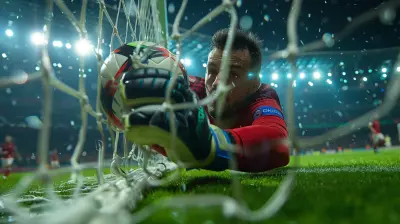How Sportsmanship Shapes the Next Generation of Athletes
14 September 2025
Sportsmanship is one of those buzzwords we hear a lot, especially when talking about young athletes. But what does it really mean, and why is it such a big deal in the sports world? More importantly, how does it influence the next generation of athletes? Well, grab a seat and let’s dive into how sportsmanship shapes not just the way kids play sports, but also how they grow into responsible, well-rounded adults.

What is Sportsmanship?
Before we explore its importance, let’s break down what sportsmanship actually is. Sportsmanship refers to the ethical and moral behavior of athletes during competition. It’s not just about winning or losing; it’s about how you play the game. It includes respect for opponents, humility in victory, grace in defeat, and adherence to the rules.So, why is it such a critical part of the athletic experience? It goes beyond the field or court—good sportsmanship helps shape character, builds community, and lays the foundation for personal growth. In short, it’s about becoming a better person, not just a better player.
The Core Values of Sportsmanship
- Respect: Treating teammates, opponents, coaches, and referees with dignity.- Fair Play: Following the rules and playing the game fairly.
- Humility: Acknowledging both victories and defeats with equal grace.
- Teamwork: Working together with others toward a common goal.
These values aren’t just essential for sports; they’re life lessons that stick with athletes long after they've hung up their jerseys.

The Role of Sportsmanship in Youth Sports
When you think about youth sports, you might picture kids running around, scoring goals, or dribbling basketballs. But behind the scenes, something much more profound is happening: these young athletes are learning life lessons that will carry them through adulthood. And yes, sportsmanship plays a huge part in that.Building Character
Sportsmanship teaches kids how to handle both success and failure. Let’s be real—no one likes to lose. But how an athlete handles a loss is far more telling than how they react to a win. By learning to deal with defeat gracefully, young athletes develop resilience, patience, and emotional intelligence. These traits aren’t just useful in sports; they’re essential for navigating life’s ups and downs.Think about it: How many times have you faced setbacks in life? Whether it’s not landing that dream job or facing personal struggles, the way you handle failure can define your future success. Sportsmanship helps mold young athletes into people who can bounce back from adversity with their heads held high.
Encouraging Teamwork
While individual talent can shine in sports, teamwork is often the key to victory. Sportsmanship fosters collaboration, teaching kids that they can’t always go it alone. Whether it’s passing the ball or covering for a teammate’s mistake, athletes learn that their success is tied to the group’s success.In essence, sportsmanship helps kids understand that the whole is often greater than the sum of its parts. This mindset carries over into school projects, future jobs, and even relationships. After all, life is a team sport, right?
Instilling Discipline
It’s not all fun and games. Sportsmanship also teaches discipline. Athletes need to follow the rules, respect authority figures like coaches and referees, and maintain self-control, even when things don’t go their way. These skills transcend the sports field, helping kids become more disciplined students, employees, and citizens.Fostering Emotional Maturity
Being a good sport means keeping your emotions in check. Whether you’re losing by a landslide or winning by a mile, how you handle your emotions is crucial. Kids who practice sportsmanship learn to manage their feelings, making them more emotionally mature. This emotional maturity enables them to face challenges with a level head, whether they’re in a high-pressure game or navigating a difficult life situation.
The Long-Term Impact of Sportsmanship
It’s easy to think of sportsmanship as something that only matters on the field, but the truth is, its impact extends far beyond that. Athletes who learn these values early on often carry them into adulthood, influencing their careers, relationships, and overall outlook on life.Leadership Skills
Leaders aren’t just born—they’re shaped by their experiences. Athletes who practice sportsmanship often grow into natural leaders. They know how to motivate others, keep their cool under pressure, and make decisions that benefit the team as a whole. These leadership qualities don’t disappear after the final whistle blows; they stick around for life.In businesses, communities, and families, former athletes who embraced sportsmanship often find themselves in leadership roles, guiding others with the same respect and integrity they learned on the field.
Conflict Resolution
Let’s face it—conflict is inevitable in both sports and life. Whether it’s a disagreement with a teammate or a competitor, sportsmanship teaches athletes how to resolve conflicts respectfully. Instead of resorting to aggression or passive-aggressiveness, athletes learn to communicate openly and solve disputes in a way that benefits everyone involved.This ability to resolve conflicts maturely is a skill that can help athletes in all aspects of life, from the workplace to personal relationships.
Empathy and Respect for Others
One of the most beautiful things about sportsmanship is that it fosters empathy. When athletes learn to respect their opponents, they start seeing them as people rather than just competitors. This empathy and respect for others can go a long way in building a more compassionate and understanding society.In a world where competition is often cutthroat, sportsmanship reminds us that we’re all human. Whether on or off the field, treating others with kindness and respect can make a big difference.

The Role of Coaches and Parents
Now, while sportsmanship is critical for the athletes, it’s equally important for the adults involved in youth sports—especially coaches and parents. These authority figures play a huge role in shaping how young athletes view sportsmanship.Setting the Example
Have you ever seen a coach or parent lose their cool on the sidelines? Unfortunately, it happens more often than it should. Coaches and parents need to remember that they’re role models. If they display poor sportsmanship, kids are likely to follow suit. On the flip side, when adults handle situations with grace and respect, kids are more likely to emulate that behavior.So, coaches and parents, if you want your young athlete to practice good sportsmanship, it starts with you. Show them how it’s done!
Providing Constructive Feedback
Constructive criticism is a big part of sports, but how it’s delivered can make all the difference. Coaches and parents should focus on providing feedback that helps athletes grow rather than tearing them down. Encouraging kids to view mistakes as opportunities for growth fosters a positive mindset and reinforces the values of sportsmanship.Encouraging a Growth Mindset
Winning isn’t everything. In fact, focusing solely on the scoreboard can lead to poor sportsmanship. Coaches and parents should encourage a growth mindset, where the emphasis is on learning and improving rather than just winning. By doing so, they help young athletes see the bigger picture and understand that sportsmanship is more important than the final score.How to Teach Sportsmanship to Young Athletes
Alright, so we know sportsmanship is important. But how exactly do we teach it to young athletes? It’s not something you can just lecture about—it has to be ingrained in the culture of the sport.Lead by Example
As mentioned earlier, kids learn by watching the adults around them. Coaches, parents, and older athletes should model good sportsmanship at all times. Whether it’s shaking hands with the opposing team or encouraging a struggling teammate, actions speak louder than words.Praise Sportsmanlike Behavior
It’s tempting to only praise kids when they score a goal or make a great play, but don’t forget to acknowledge sportsmanlike behavior. If a young athlete helps an opponent up after a fall or congratulates the other team after a loss, make sure to highlight that as much as you would a game-winning shot.Make It Part of the Game
Sportsmanship should be just as important as drills and practice. Make it a point to incorporate sportsmanship into your coaching. For example, before and after every game, encourage players to shake hands with their opponents. During practice, emphasize the importance of fair play and respect for others.Encourage Self-Reflection
After games, encourage young athletes to reflect on their behavior. Did they show respect to their teammates and opponents? Did they handle victory or defeat with grace? By encouraging self-reflection, you help kids become more aware of their actions and how they can improve—not just as players, but as people.
Conclusion
At the end of the day, sportsmanship is about more than just playing by the rules—it’s about building character, fostering empathy, and teaching life lessons that extend far beyond the playing field. Athletes who embrace sportsmanship not only become better players, but they also grow into stronger, more compassionate individuals.So, whether you’re a coach, parent, or young athlete, remember that how you play the game matters just as much—if not more—than the final score. After all, the lessons learned through sportsmanship will last a lifetime.
all images in this post were generated using AI tools
Category:
Sportsmanship AwardsAuthor:

Preston Wilkins
Discussion
rate this article
1 comments
Carson Russell
Great article! It’s vital to instill sportsmanship in young athletes. Teaching respect, teamwork, and humility not only enhances their performance but also shapes their character off the field. These values are essential for building a positive sporting environment and fostering future leaders in sports.
September 24, 2025 at 10:39 AM

Preston Wilkins
Thank you for your insightful comment! I completely agree that sportsmanship plays a crucial role in developing not just athletes, but well-rounded individuals.


